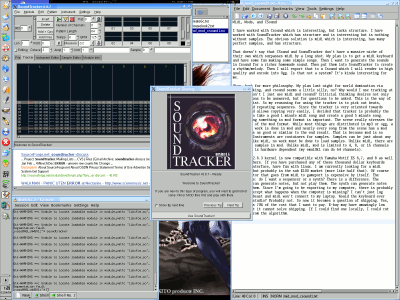
Greetings once again. Today's lesson is access and connectivity. I explained to two of my hacker friends that I had a legit use for Peer 2 Peer software and was unable to get it to work due to difficulties that are absolutely silly. I would like to remedy this problem. What I need is a easy to use program that can copy a 3 MB file from a user's computer to a file on another user's computer. Simple, right? The user has Hotmail which will not allow 3 MB file. Try 1: fail.
If I had an open port, I could use my ftp server to allow the user to upload that file. But MSN decided that it needed to close all ports on my DSL modem. Maybe MSN wants to protect me from viruses (oops, I got ms blaster, it's not secure from viruses). Maybe MSN wants me to buy SoHo service for $20 per month extra to unblock those ports. Maybe MSN wants to curb piracy (nope, p2p networks work fine). I don't care, I hate MSN. Try 2: fail.
So I will use p2p network, right? Well, I can't convince the user to install a p2p program. Even if I could, it might take a day to show up on the searches. Also, the user would have to spend his time watching to ensure that no one but me downloads it. If anyone downloads it (unlikely, but possible), our file will become publicly available without our permission. Try 3: fail.
So my idea after many hours was to use IRC. I have successfully downloaded files using IRC. I would simply have the user download mIRC. He would connect to irc.efnet.org and join #hackmusic. I would run KSirc, connect to efnet, and join #hackmusic. There he would use DCC to send me the file. I would accept the file and it would copy at ~25 kB/s. That is the theory. I wasn't able to convince the person to download mIRC, since he wasn't very technically enclined. The same reason as p2p, really. IRC is fine for technically enclined people and people who are motivated to transfer at the cost of IRC's technical sillyness. Try 4: fail.
What the user decided to do was send the file on a CDR snail mail. A large dent was punched in it in it's 250 mile journey. It cost $0.50 to burn and $0.76 to mail. The end result is a CD that is quite worthless. It even crashes Windows 98 hard (ctrl-alt-del twice is the only solution). Try 5: fail.
The final solution is to burn another copy of the cd and send it media mail in a squishy envelope for $1 or so. The final cost is around $2.76 and the time of three people. Try 6: success*.
* It's not really a success if it costs far more than the best solution. If you call that success, I want to see your failures.
Peer to Peer networks have a legitimate purpose! Courts, congress, and the RIAA should not be attacking my means of communication.
One of my friends offered a shell account for sparse personal use and development use. Shell accounts are useful for hackers because they allow a hacker to use two computers and test much communication between the two over the internet which is always far more difficult than communication between two computers over an intranet. A shell account resolves one of the problems I have with connectivity. That problem is that I need a box with open ports to the outside world. One thing is that it needs to be very secure. Open ports to the outside world makes a box very vulnerable. Script kiddies, spammers, black hats, and the RIAA all want control over your box. A shell account allows one knowledgable person ensure the security of many people's open access to the web. But to be secure, a box cannot be completely open to the web. A firewall can block off ports that are not needed to be open to ensure that new vulnerabilities cannot be exploited. But vital services and development ports need to be open so that the shell account is useful enough for the users. A web account could almost solve my problem of file transmission except that I would have to 1) Convince the user to download and use sftp. 2) Give the user my ftp password. 3) Teach the user to use sftp over the phone at 1.6c/min. 4) Change the password when they are finished. These are impossible, so I am back to square one. I only need to transfer a few files, what's the deal?
The deal is simply that before 1999, this was hard and was the realm of BBSers. Before 1994, this was nearly impossible and was the realm of well-funded computer scientists (not even musicians). The idea is that in the 5 years that it has been possible, no one has made a perfect system for end-users to transmit large personal files. The perfect system would be free on both the sender and recipient ends. It would be able to navigate around firewalls. It would not require software with heavy configuration. It would be rock solid stable and secure.
We live in an interesting time. 5 years ago, what I am attempting was very hard. It's becoming easier, but not quite yet. If the user I was dealing with was half as technical as me, he could configure his site on his web server (wsu.edu) and upload his files easily. If it was me who had the data, I could put it on my web server and have the user grab them fairly quickly.

-
Leave a Reply





Comments: 0
Leave a reply »